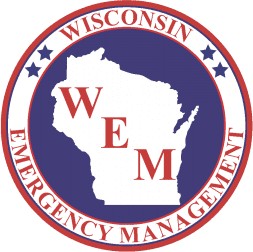The National Weather Service (NWS) is expecting dry weather for the next 24 hours. However, Saturday night, […]
Gov. Scott Walker joined Maj. Gen. Don Dunbar, Wisconsin’s adjutant general, and Wisconsin Emergency Management Administrator Brian […]
(Lake Delton) – Communications are critical during a disaster. Getting information and data to the right people at the right time can save lives. That’s why Sauk County is hosting a multi-agency communications exercise called “SIMCOM 2017”.
This document summarizes the actions taken by member and partner agencies of the Wisconsin Homeland Security Council. The agency reports presented herein detail the new and ongoing efforts of Wisconsin state agencies to prepare for, respond to, and recover from threats to the security of the State of Wisconsin.
(Madison) – The National Weather Service says today’s statewide tornado drills are a “Go”.
(MADISON) – Schools, businesses, families, and individuals have two opportunities to test their emergency plans during statewide tornado drills on April 20, 2017. The drills are part of the annual spring severe weather campaign to encourage everyone in Wisconsin to be ready for possible tornadoes and severe weather.
Madison – Governor Scott Walker joined Wisconsin’s Homeland Security Advisor and Adjutant General of the Wisconsin National Guard, Major General Donald Dunbar and Wisconsin Emergency Management (WEM) Administrator Brian Satula today at the 50th Annual Governor’s Conference on Emergency Management and Homeland Security. Held at the Chula Vista Resort in Wisconsin Dells, the conference attracts more than 400 representatives from fire, law enforcement, emergency management, and other first responder agencies.
(MADISON) – Don’t forget to change your clocks ahead one hour on Sunday as Daylight Saving Time begins. It’s also a great time to change your batteries in smoke alarms and carbon monoxide detectors and get other emergency safety items ready for spring storm season.
50th Annual Governor’s Conference on Emergency Management and Homeland Security Begins Wednesday
Students at Waubesa Intermediate School in McFarland Learn How to Be Prepared for Disasters & Emergencies


